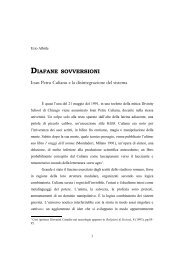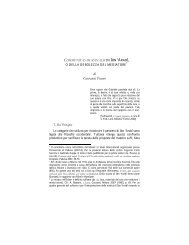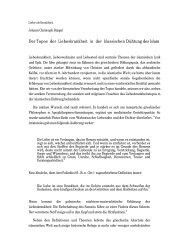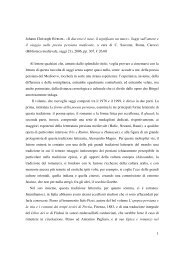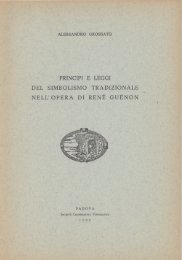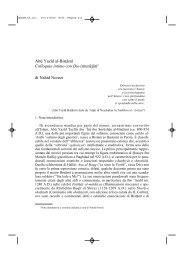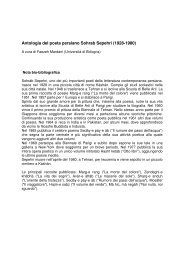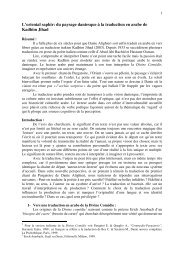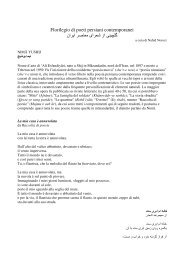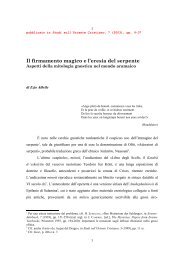(von) Bodenstedt, a German orientalist of the 19th century, and his ...
(von) Bodenstedt, a German orientalist of the 19th century, and his ...
(von) Bodenstedt, a German orientalist of the 19th century, and his ...
You also want an ePaper? Increase the reach of your titles
YUMPU automatically turns print PDFs into web optimized ePapers that Google loves.
Friedrich (<strong>von</strong>) <strong>Bodenstedt</strong>, a <strong>German</strong> <strong>orientalist</strong> <strong>of</strong> <strong>the</strong> <strong>19th</strong> <strong>century</strong>, <strong>and</strong> <strong>his</strong> Lieder<br />
des Mirza Schaffy *<br />
by Johann Christoph Bürgel<br />
1<br />
Friedrich (<strong>von</strong>) <strong>Bodenstedt</strong> was born April 22, 1819 in <strong>the</strong> town <strong>of</strong> Peine, south <strong>of</strong><br />
Hannover, as son <strong>of</strong> a brewer, <strong>and</strong> died April 18, 1892 in Wiesbaden. In <strong>his</strong> youth<br />
he became a commercial apprentice, <strong>the</strong>n studied for some time <strong>his</strong>tory <strong>and</strong> foreign<br />
languages at <strong>the</strong> University <strong>of</strong> Göttingen, where he, allegedly, also made <strong>his</strong> PhD. 1 In<br />
1840 he travelled to Moscow, <strong>and</strong> was engaged as private tutor in <strong>the</strong> house <strong>of</strong> <strong>the</strong><br />
Russian prince Michail Galitsin, who occupied a high <strong>of</strong>fice at <strong>the</strong> imperial court. In<br />
1843 he went to Tiflis, to occupy a teacher’s post at a high school <strong>the</strong>re. During <strong>his</strong><br />
Tiflis years he made <strong>the</strong> acquaintance <strong>of</strong> a Muslim teacher, who became <strong>his</strong> friend<br />
<strong>and</strong> <strong>his</strong> instructor, who introduced him into <strong>the</strong> Persian, <strong>and</strong> <strong>the</strong> “Tatar” (i.e. Turkish)<br />
languages <strong>and</strong> inspired him to write <strong>his</strong> erstwhile famous Lieder des Mirza Schaffy.<br />
From Tiflis, he made a travel which led him over Yalta <strong>and</strong> Odessa to Constantinople,<br />
where he spent a few months, <strong>and</strong> <strong>the</strong>n returned to Tiflis <strong>and</strong> from <strong>the</strong>re to <strong>German</strong>y.<br />
A number <strong>of</strong> remarkable books resulted from <strong>the</strong>se all in all seven years abroad. A<br />
travelogue, a book <strong>of</strong> <strong>his</strong>tory, a book <strong>of</strong> songs, <strong>and</strong> several translations from Russian<br />
literature. The first to appear was an introduction into <strong>the</strong> <strong>his</strong>tory <strong>of</strong> <strong>the</strong> peoples <strong>of</strong><br />
<strong>the</strong> Caucasus, entitled Die Völker des Kaukasus und ihre Freiheitskämpfe gegen die<br />
Russen, published in 1848 in Frankfurt on <strong>the</strong> Main, In 2 volumes <strong>and</strong> 572 pages.<br />
There, <strong>the</strong> author gives short sketches <strong>of</strong> all <strong>the</strong> Asian tribes <strong>and</strong> ethnic groups<br />
between <strong>the</strong> Black <strong>and</strong> Caspian Seas. He describes <strong>the</strong> liberation war in Daghestan<br />
led by <strong>the</strong> fabulous Shamyl, who succeeded in unifying <strong>the</strong> various Muslim tribes<br />
torn asunder by confessional conflicts, mainly between Sunnites <strong>and</strong> Shiites,<br />
awaking <strong>the</strong>ir will to throw <strong>of</strong>f <strong>the</strong> foreign yoke. The book also has a long chapter on<br />
Sufism, which, in its moderate form, B. rightly considers to be a really humane,<br />
humanistic movement.<br />
The second book is quite different from t<strong>his</strong> sober, even though never boring<br />
h<strong>and</strong>book. Its very title Tausend und ein Tag im Orient (“Thous<strong>and</strong> <strong>and</strong> One Days in<br />
<strong>the</strong> Orient”), reminiscent <strong>of</strong> two famous collections <strong>of</strong> Oriental tales, reveals <strong>the</strong><br />
author’s different intention. T<strong>his</strong> book, even though not a fairy tale, is in fact ra<strong>the</strong>r an<br />
amusing causerie about <strong>his</strong> Tiflis years. It contains lots <strong>of</strong> poems, which are<br />
presented as translations <strong>of</strong> songs he had heard from <strong>his</strong> friend Mirza Schaffy (=<br />
Shafî‘or Shâfi‘î) ei<strong>the</strong>r in Persian or in Tatar <strong>and</strong> translated into beautiful <strong>German</strong><br />
verse.<br />
It was <strong>the</strong> idea <strong>of</strong> <strong>his</strong> main publisher, Rudolf <strong>von</strong> Decker in Berlin, to extract <strong>the</strong>se<br />
poems <strong>and</strong> publish <strong>the</strong>m as a separate book, entitled Die Lieder des Mirza Shaffy,<br />
* Paper given at <strong>the</strong> “International Conference on <strong>the</strong> Study <strong>of</strong> Persian Culture in <strong>the</strong> West”, State<br />
Hermitage, St. Petersburg, 2004<br />
1 Some <strong>of</strong> <strong>his</strong> letters are signed with Dr. F.B. However, Fränkel in <strong>the</strong> Allgemeine deutsche Biographie<br />
(AdB) remarked that “Wann, wo, wie er den Doctorgrad erlangt hat, ist nicht nachweisbar” vol. 47, p.<br />
45.
2<br />
<strong>and</strong> it was t<strong>his</strong> little book, which was to see an extraordinary, even miraculous<br />
success, outstripping by far not only all <strong>the</strong> o<strong>the</strong>r publications <strong>of</strong> <strong>Bodenstedt</strong>, but any<br />
o<strong>the</strong>r book published in <strong>the</strong> 19 th <strong>century</strong>. We will return to <strong>his</strong> publications later on,<br />
but for <strong>the</strong> moment accompany our author through <strong>the</strong> remaining five decades <strong>of</strong> <strong>his</strong><br />
eventful life.<br />
After several attempts to settle down as journalist <strong>of</strong> various <strong>German</strong> newspapers, in<br />
various <strong>German</strong> towns including Berlin, Bremen, Hannover <strong>and</strong> o<strong>the</strong>r places, B.<br />
accepted an invitation from King Maximilian II. <strong>of</strong> Bavaria (r. 1848-64). to join <strong>his</strong><br />
university <strong>and</strong> <strong>his</strong> private circle in Munich. In 1854, <strong>the</strong> king appointed him pr<strong>of</strong>essor<br />
<strong>of</strong> Slavic languages at <strong>the</strong> University, had him partake in <strong>his</strong> weekly “Symposia”, <strong>and</strong><br />
paid him an annual salary <strong>of</strong> 1200 gulden. Already in 1852, B. had published Michail<br />
Lermont<strong>of</strong>f’s poetischer Nachlaß, zum Erstenmal in den Versmaaßen der Urschrift<br />
aus dem Russischen übersetzt, mit Einleitung und erläuterndem Anhange versehen”<br />
in 2 volumes, Two years later, 1854, he published <strong>his</strong> translations <strong>of</strong> Pushkin’s<br />
poetical works comprising <strong>the</strong> poems <strong>and</strong> Evgeniy Onegin, <strong>and</strong> in 1866 he crowned<br />
<strong>his</strong> Russian studies by a 4 volume work Russische Dichter. Gradually, however, B’s<br />
interest switched over to Engl<strong>and</strong>, in 1859 he spent some time in London, making<br />
studies in various libraries. From 1858-1866 he taught, still in Munich, English<br />
literature. In 1858, he published <strong>the</strong> first volume <strong>of</strong> <strong>his</strong> important work<br />
Shakespeare’s Zeitgenossen und ihre Werke.. His position in Munich was, however,<br />
dependent on <strong>the</strong> king’s favour <strong>and</strong> thus ended with Maximilian’s sudden death in<br />
1864. B. did not succeed in winning over <strong>the</strong> favour <strong>of</strong> <strong>the</strong> next king, Ludwig II, .<br />
Instead, he intensified <strong>his</strong> English studies, founding or co-founding, in <strong>the</strong> very year<br />
1864, <strong>the</strong> (still existing) <strong>German</strong> Shakespeare society <strong>and</strong> editing <strong>the</strong> first two<br />
volumes <strong>of</strong> its periodical. Perhaps B. had been fostering some hope to be appointed<br />
in Göttingen by <strong>the</strong> British king George V. (r. 1851-1866), who had in fact shown<br />
interest in <strong>the</strong>se activities. But t<strong>his</strong> hope was shattered with <strong>the</strong> events <strong>of</strong> 1866, <strong>the</strong><br />
fall <strong>of</strong> king George V. <strong>of</strong> Hannover, who had participated in <strong>the</strong> Prussian-Austrian war<br />
on <strong>the</strong> side <strong>of</strong> <strong>the</strong> Austrians, <strong>and</strong> was overthrown by <strong>the</strong> Prussians after <strong>the</strong>ir victory<br />
over Austria. T<strong>his</strong> is why, in <strong>the</strong> spring <strong>of</strong> 1867, B. followed <strong>the</strong> invitation <strong>of</strong> <strong>the</strong> duke<br />
George II. <strong>of</strong> Saxonia (Sachsen-Meiningen), <strong>the</strong> so-called <strong>the</strong>atre-duke<br />
(“Theaterherzog”), to take on <strong>the</strong> position <strong>of</strong> director <strong>of</strong> <strong>the</strong> court <strong>the</strong>atre <strong>of</strong><br />
Meiningen, a small town in Central <strong>German</strong>y, which, under <strong>his</strong> rule, won farreaching<br />
fame. Already in Munich, B. had directed several plays, fur<strong>the</strong>rmore, he<br />
had himself started to write plays, <strong>and</strong> certainly now dreamt <strong>of</strong> trying <strong>the</strong>m out on<br />
<strong>the</strong> Meiningen stage. In 1866, he moved from Munich to Meiningen, <strong>and</strong> it was <strong>the</strong>re,<br />
in Meiningen, that nobility, i. e. <strong>the</strong> right to add <strong>the</strong> syllable <strong>von</strong> to <strong>his</strong> name, was<br />
bestowed upon him, who thus became Friedrich <strong>von</strong> <strong>Bodenstedt</strong>, i.e. was raised to<br />
<strong>the</strong> peerage, as were two o<strong>the</strong>r outst<strong>and</strong>ing 19 th <strong>century</strong> <strong>orientalist</strong>s <strong>of</strong> <strong>German</strong><br />
tongue: Joseph Hammer, who became Joseph <strong>von</strong> Hammer-Purgstall by inheriting<br />
<strong>the</strong> name <strong>of</strong> <strong>his</strong> benefactor Freiherr <strong>von</strong> Purgstall, <strong>and</strong> Vincenz Rosenzweig. who<br />
became Ritter Vinzenz <strong>von</strong> Rosenzweig-Schwannau through an imperial act <strong>of</strong> <strong>the</strong><br />
Austrian government... Yet, B. did not hold <strong>the</strong> post for much more than two years,<br />
after which he tendered <strong>his</strong> resignation. He remained, however, in Meiningen until<br />
1875, exercising some influence on <strong>the</strong> <strong>the</strong>atre. From Meiningen, he moved to<br />
Hannover, <strong>and</strong>, after fur<strong>the</strong>r disappointments with that town, so close to <strong>his</strong> native<br />
Peine, he finally settled down in Wiesbaden, where he spent <strong>the</strong> rest <strong>of</strong> <strong>his</strong> life until<br />
<strong>his</strong> death in 1892. From Wiesbaden, he undertook one more major voyage. During<br />
<strong>the</strong> years 1880 to 1882 he traversed <strong>the</strong> United States, <strong>of</strong> which again, as <strong>of</strong> <strong>his</strong><br />
former foreign ventures, he gave public account in a travelogue, entitled Vom<br />
Atlantischen zum Stillen Ozean.
3<br />
His funeral ceremony was attended by several thous<strong>and</strong> mourners, a bronze bust<br />
was erected over <strong>his</strong> grave.<br />
The portrait that is drawn <strong>of</strong> him by Fränkel in <strong>the</strong> Allgemeine Deutsche Biographie<br />
shows us a “man, whom countless people sincerely <strong>and</strong> warmly liked <strong>and</strong> loved or<br />
even adored with enthusiasm, <strong>and</strong> whose imperturbable naïveté did never appear<br />
ridiculous to us, notwithst<strong>and</strong>ing a certain vainglory, nor <strong>the</strong> permanent financial<br />
penuries <strong>of</strong> <strong>the</strong> writer who was so fond <strong>of</strong> life. In him, modesty merged with <strong>the</strong> selfconsciousness<br />
based on <strong>his</strong> competence”.<br />
Let me add here some more informations concerning <strong>his</strong> private life He married in<br />
1850 Matilde Osterwald, whom he first met in <strong>the</strong> castle Escheberg near Kassel, <strong>and</strong><br />
<strong>the</strong>n fell in love, while playing with her <strong>the</strong> roles <strong>of</strong> Wilhelm <strong>and</strong> Marianne in Goe<strong>the</strong>’s<br />
play “Die Geschwister”. She bore him five children, four daughters <strong>and</strong> a son. The<br />
marriage seems to have been happy <strong>and</strong> lasted until <strong>his</strong> death in 1892; <strong>his</strong> wife<br />
survived him. He called her by <strong>the</strong> name Edlitam, which, exotic as it sounds, turns out<br />
to be just an anagram <strong>of</strong> her first name Matilde. The songs <strong>of</strong> Mirza Schaffy as well<br />
as <strong>the</strong> book “Tausend und ein Tag im Orient” are dedicated to her <strong>and</strong> probably<br />
o<strong>the</strong>r works, too.<br />
B. was painted by Wilhelm <strong>von</strong> Kaulbach, a well-known Munich painter famous for <strong>his</strong><br />
<strong>his</strong>torical scenes. The portrait was meant to appear in <strong>the</strong> <strong>the</strong>n popular periodical<br />
Die Gartenlaube after Oct. 1867 2 . In ano<strong>the</strong>r letter, B .mentions <strong>the</strong> fact that a<br />
<strong>German</strong> bookseller in London, named Trübner, had a life size bust <strong>of</strong> him made <strong>of</strong><br />
Cararian marble (after a plaster bust already existing in London) to adorn <strong>his</strong><br />
bookshop. 3<br />
The Literary Gazette <strong>of</strong> London called <strong>his</strong> translations <strong>of</strong> Skakespeare’s sonnets “a<br />
master piece, which renders <strong>the</strong> particular beauty <strong>of</strong> <strong>the</strong> original in <strong>the</strong> most faithful<br />
manner” 4 :And here an amusing <strong>of</strong>ten told anecdote: In 1850 (?) he was sent by a<br />
group <strong>of</strong> Prussian free trade associations to represent <strong>the</strong>m during <strong>the</strong> free trade<br />
congress in Paris. When asked to speak (he knew French well), he refused with <strong>the</strong><br />
argument that <strong>the</strong> complete absence <strong>of</strong> any <strong>German</strong> flag among <strong>the</strong> many European<br />
flags hoisted did not inspire him. Victor Hugo exclaimed: “Monsieur, vous êtes le<br />
drapeau vivant de l’Allemagne!” .<br />
.<br />
Now let us return to <strong>his</strong> writings. Their enormous quantity resulted from <strong>the</strong> fact that<br />
B. acted on so many stages: He wrote travelogues, novels, novellas, poems, plays,<br />
made many translations from Russian, English, Persian, <strong>and</strong> wrote important<br />
scientific works. Already in <strong>the</strong> seventies <strong>of</strong> <strong>the</strong> 19 th c. i. e., when B. was around <strong>his</strong><br />
fiftieth year, a first edition <strong>of</strong> <strong>his</strong> collected writings appeared in 12 volumes, to which<br />
many fur<strong>the</strong>r works were added in <strong>the</strong> years to come. B’s lasting merits are<br />
considered to lie both in <strong>his</strong> travelogues <strong>and</strong> in <strong>his</strong> literary translations from Russian<br />
<strong>and</strong> from English, but also in <strong>his</strong> <strong>German</strong> versions <strong>of</strong> Hafiz <strong>and</strong> Omar Khayyam,<br />
translated from <strong>the</strong> Persian original.<br />
In chronological order, he translated Lermontov (2 v., Berlin 1852), Pushkin (3 v., Berlin 1854-55), <strong>and</strong><br />
Turgenyev (2 v. , Munich 1864-65). Vol. VII <strong>of</strong> <strong>his</strong> collected works is dedicated to Russian literature<br />
<strong>and</strong> contains poems <strong>of</strong> over twenty Russian poets such as Karamsin, Shukovski, prince Wyazemski,<br />
2 Mentioned in a letter concerning <strong>the</strong> 19 th edition <strong>of</strong> Dichterleben 160<br />
3 Dichterleben 118<br />
4 Dichterleben 123-3
4<br />
Kryl<strong>of</strong>, Turgenyev <strong>and</strong> Ukrainian folk songs (complete list Dichterleben 244). In 1858 he started to<br />
translate old-English <strong>the</strong>atre plays <strong>and</strong> engaged himself in a new Shakespeare edition, which<br />
appeared in <strong>the</strong> years 1866-72 <strong>and</strong> comprised 9 volumes. His share in t<strong>his</strong> new translation are first <strong>of</strong><br />
all <strong>the</strong> Sonnets, which also appeared separately in various editions <strong>and</strong> were <strong>the</strong> first <strong>German</strong><br />
translation to appear. But he also translated 8 <strong>of</strong> <strong>the</strong> 37 plays,. four comedies <strong>and</strong> four tragedies,<br />
namely A Midsummer Night’s Dream, The Tempest, Measure for Measure, The Merchant <strong>of</strong> Venice,<br />
Hamlet, O<strong>the</strong>llo, Romeo <strong>and</strong> Juliet, Macbeth (Dichterleben 247). His translation <strong>of</strong> King Lear appeared<br />
only shortly before <strong>his</strong> death. Fur<strong>the</strong>rmore he published three volumes <strong>of</strong> studies <strong>of</strong> <strong>the</strong> works <strong>of</strong><br />
contemporaries <strong>of</strong> Shakespeare under <strong>the</strong> title <strong>of</strong> Shakespeare’s Zeitgenossen und ihre Werke, vol. I<br />
(1858): John Webster, vol II (1860): John Ford, vol III (1860): John Lilly, Robert Greene <strong>and</strong><br />
Christopher Marlowe (Dichterleben 242). In one <strong>of</strong> <strong>his</strong> letters to <strong>the</strong> publisher, B. emphasizes that<br />
<strong>the</strong>se studies (including many translations) were a necessary preparatory step leading to <strong>his</strong><br />
Shakespeare translations . As I already mentioned , B: founded <strong>the</strong> <strong>German</strong> Shakespeare Society,<br />
which exists up to <strong>the</strong> present day..<br />
But he also wrote poetry <strong>and</strong> prose <strong>of</strong> <strong>his</strong> own. His tales <strong>and</strong> novels comprise 7 volumes . Towards <strong>the</strong><br />
end <strong>of</strong> <strong>his</strong> life he published <strong>his</strong> Memoirs Erinnerungen aus meinem Leben (2 vol. 1888-90). One year<br />
after <strong>his</strong> death, a volume <strong>of</strong> letters he had written between 1850 <strong>and</strong> <strong>his</strong> death in 1892 was published<br />
under <strong>the</strong> title <strong>of</strong> “Ein Dichterleben in Briefen”. These letters are exclusively directed to <strong>his</strong> publisher<br />
Rudoph <strong>von</strong> Decker <strong>and</strong> <strong>his</strong> collaborators. They were edited by <strong>his</strong> successor G.Schenck <strong>and</strong> reflect<br />
<strong>the</strong> difficult, unsteady relationship <strong>of</strong> an author <strong>and</strong> <strong>his</strong> publisher, wavering between friendship <strong>and</strong><br />
conflict, when B. at <strong>the</strong> one h<strong>and</strong> is late with <strong>his</strong> manuscripts <strong>and</strong> at <strong>the</strong> o<strong>the</strong>r dem<strong>and</strong>s a higher<br />
honorarium, in view <strong>of</strong> <strong>the</strong> success <strong>of</strong> <strong>his</strong> books.<br />
His by far greatest success were, as already mentioned above, <strong>his</strong> Lieder des Mirza<br />
Schaffy, which he published in 1852, i.e. at <strong>the</strong> age <strong>of</strong> only 33. He presented <strong>the</strong>m<br />
as translation <strong>of</strong> poetry by <strong>his</strong> Tiflis teacher, <strong>and</strong> <strong>the</strong>y were accepted as such by <strong>the</strong><br />
public. But <strong>the</strong>y were <strong>his</strong> own, <strong>and</strong> <strong>the</strong>y were meant as reaction to <strong>the</strong> political<br />
situation <strong>of</strong> <strong>the</strong> so-called Nachmärz period, depicting a cheerful, serene attitude<br />
towards life in skilfully woven oriental guise. T<strong>his</strong> publication was reprinted more<br />
<strong>of</strong>ten than any o<strong>the</strong>r book <strong>of</strong> that time. In 1892, <strong>the</strong> year <strong>of</strong> B’s death, it reached its<br />
140 th edition, In 1917, 65 years after its first publication, it reached its 264 th edition!<br />
Fur<strong>the</strong>rmore it was translated into numerous European languages, including English,<br />
Italian, Dutch, Polish, Russian, <strong>and</strong> even into Hebrew.<br />
What was <strong>the</strong> secret <strong>of</strong> t<strong>his</strong> success? In order to answer t<strong>his</strong> question we have to<br />
make some preliminary enquiries. First <strong>of</strong> all, we have to talk about <strong>the</strong> fictitious<br />
author Mirza Schaffy. The name Schaffy is, <strong>of</strong> course, <strong>the</strong> Arabic-Persian shafî‘,<br />
meaning “mediator” or “intercessor”. Mirza, as B. himself explains, would mean<br />
prince, if it came after <strong>the</strong> name; before <strong>the</strong> name, it means hardly more than “Herr”.<br />
T<strong>his</strong> man did in fact exist. He is one <strong>of</strong> <strong>the</strong> recurrent characters, in B’s travelogue<br />
Tausend und ein Tag im Orient. The title <strong>of</strong> t<strong>his</strong> book, reminiscent <strong>of</strong> <strong>the</strong> Thous<strong>and</strong><br />
<strong>and</strong> one Nights is not chosen per chance. The book is in fact a mixture <strong>of</strong> reality <strong>and</strong><br />
fiction. And t<strong>his</strong> is made clear by <strong>the</strong> anecdote <strong>of</strong> how it came into existence. It was<br />
colourfully described by B. For reasons <strong>of</strong> space, it cannot be quoted here in full, a<br />
brief summary may suffice:<br />
It was on an evening in <strong>the</strong> terrible days <strong>of</strong> <strong>the</strong> 1848 revolution, “The sky was red with <strong>the</strong> blazing<br />
flames <strong>of</strong> <strong>the</strong> burning suburbs (<strong>of</strong> Munich)” , when “a number <strong>of</strong> friends <strong>and</strong> acquaintances had<br />
ga<strong>the</strong>red in my apartment, to find for a while some repose through cosy chattering after <strong>the</strong> shocking<br />
events <strong>of</strong> <strong>the</strong> day.”.<br />
“<strong>Bodenstedt</strong>”, said friend Auerbach, “You are less flustered than we are. Tell us about your adventures<br />
in <strong>the</strong> Orient. Make a merry choice from your past, that will transfer us into a new world <strong>and</strong> banish<br />
<strong>the</strong> chagrin <strong>of</strong> <strong>the</strong> present!” The idea was well received by <strong>the</strong> assembly. O<strong>the</strong>r friends supported <strong>the</strong><br />
dem<strong>and</strong> <strong>and</strong> so B. started telling. “<br />
…
5<br />
“So we sat until late in <strong>the</strong> night, all listening with great attention to my tales <strong>and</strong> nobody thinking any<br />
more about <strong>the</strong> turmoil outside, <strong>the</strong> burning suburbs <strong>and</strong> <strong>the</strong> shooting .” 5<br />
The situation is reminiscent <strong>of</strong> that <strong>of</strong> <strong>the</strong> origin <strong>of</strong> <strong>the</strong> Decamerone <strong>and</strong> probably<br />
even consciously modelled after it: In a manor house near Florence Boccaccio<br />
entertained members <strong>of</strong> <strong>the</strong> high society who had left <strong>the</strong> town to escape <strong>the</strong> pest <strong>of</strong><br />
1348, exactly 500 years before <strong>the</strong> event, B. is mentioning. .<br />
Bodenstdt states that, in t<strong>his</strong> book, <strong>the</strong> poetic aspects <strong>of</strong> <strong>his</strong> stay in Tiflis are in <strong>the</strong><br />
foreground <strong>and</strong> that those, who want more scientific information, should read Die<br />
Völker des Kaukasus und ihre Freiheitskämpfe gegen die Russen..<br />
„It is <strong>the</strong> intention <strong>of</strong> t<strong>his</strong> book“ , he says on p. 144 <strong>of</strong> <strong>the</strong> Thous<strong>and</strong> <strong>and</strong> One Days,<br />
„to form a well-rounded whole, <strong>and</strong> at <strong>the</strong> same time a poetic <strong>and</strong> vivid supplement to<br />
those <strong>of</strong> my writings, whose content is essentially dealing with <strong>the</strong> ethnographic,<br />
statistic, culture <strong>and</strong> war <strong>his</strong>torical situation <strong>of</strong> <strong>the</strong> countries between <strong>the</strong> Caspian<br />
<strong>and</strong> <strong>the</strong> Black Sea“ 6<br />
The encounters with Mirza Schaffy in Tiflis are told in a way leaving some doubt<br />
about <strong>the</strong> identity <strong>of</strong> that sage <strong>of</strong> G<strong>and</strong>ja, as he would call himself. In fact, Mirza<br />
Schaffy presented himself with unrestricted self-praise as <strong>the</strong> wisest man <strong>of</strong> <strong>the</strong><br />
Orient <strong>and</strong> he told <strong>Bodenstedt</strong>, that, by becoming <strong>his</strong> pupil, he, B., would become<br />
<strong>the</strong> wisest man <strong>of</strong> <strong>the</strong> Occident. Things became complicated when ano<strong>the</strong>r Muslim<br />
scribe, Mirza Yusuf, not only vindicated <strong>the</strong> same honour for himself, but told B. that<br />
Mirza Schaffy could nei<strong>the</strong>r read nor sing, which, when brought to <strong>the</strong> knowledge <strong>of</strong><br />
Mirza Schaffy through <strong>Bodenstedt</strong> himself, incited <strong>the</strong> rage <strong>of</strong> <strong>the</strong> former, who did not<br />
hesitate to cure <strong>his</strong> rival <strong>of</strong> <strong>his</strong> arrogance by taking <strong>of</strong>f <strong>his</strong> slipper <strong>and</strong> giving him a<br />
sound thrashing on <strong>his</strong> head.<br />
. On <strong>the</strong> o<strong>the</strong>r h<strong>and</strong>, Mirza Schaffy , is <strong>the</strong> hero <strong>of</strong> two heart-breaking love stories.<br />
One, concerning a girl named Zuleikha, is revealed to B. by <strong>the</strong> Mirza, after <strong>his</strong><br />
tongue has been loosened by large quantities <strong>of</strong> wine. It ended tragically with a<br />
failed elopement. The o<strong>the</strong>r is witnessed by B. . Both <strong>the</strong>se love stories are<br />
dramatic <strong>and</strong> not lacking in operatic or even operetta-like features. Thus, <strong>the</strong> Mirza<br />
visits Hafiza, <strong>the</strong> adored one, helped by a girl friend <strong>of</strong> <strong>his</strong> lady, in female guise.<br />
Again, <strong>the</strong> case seems hopeless, until all <strong>of</strong> sudden, fate interferes in favour <strong>of</strong> <strong>the</strong><br />
loving couple by taking away <strong>the</strong> main obstacle: Hafiza’s fa<strong>the</strong>r dies, <strong>and</strong> <strong>the</strong><br />
marriage takes place, however only after B’s departure from Tiflis. .<br />
All <strong>the</strong>se stories are interspersed with <strong>the</strong> love-songs, which <strong>the</strong> Mirza seems to<br />
invent while reciting <strong>the</strong>m. And all <strong>the</strong>se poems, with <strong>the</strong> names <strong>of</strong> Zuleikha <strong>and</strong><br />
Hafiza, but also those directed against <strong>the</strong> obstinate arrogant Mirza Yusuf, reappear.<br />
In <strong>the</strong> Lieder. They apparently thus form <strong>the</strong> factual background <strong>of</strong> <strong>the</strong> texts found in<br />
<strong>the</strong> Lieder, where no such information is given. The events relate to <strong>the</strong> poems in <strong>the</strong><br />
way so familiar to students <strong>of</strong> Arabic poetry, <strong>the</strong> way <strong>the</strong> akhbâr or <strong>his</strong>torical<br />
informations are linked with <strong>the</strong> poems, e, g, in <strong>the</strong> Kitab al-aghânî <strong>and</strong> otter similar<br />
sources <strong>of</strong> <strong>the</strong> Islamic past, anthologies <strong>of</strong> Arabic, Persian etc. poetry. All t<strong>his</strong><br />
shows, how skilfully <strong>the</strong> fallacy had been woven by B.<br />
And <strong>the</strong>re is even more to it. In <strong>the</strong> sessions, where <strong>the</strong>se <strong>and</strong> o<strong>the</strong>r poems were<br />
quoted by <strong>the</strong> Mirza, B. put him <strong>the</strong> question, if he would agree that he renders some<br />
<strong>of</strong> <strong>his</strong> poetry into <strong>German</strong>. The question is phrased in a bombastic, probably<br />
parodied oriental style, which, however, hardly undermines <strong>the</strong> apparent <strong>his</strong>toricity <strong>of</strong><br />
<strong>the</strong> scene:<br />
5 Dichterleben 232-33<br />
6 Tausend und ein Tag, p. 144
6<br />
“Mirza Schaffy”, I interrupted him, “wouldn’t it be a wise beginning, to clo<strong>the</strong> your wisdom into an<br />
oriental apparel , so as to make <strong>the</strong>m a mirror for fools, a guidance for <strong>the</strong> erring, <strong>and</strong> a fountain <strong>of</strong><br />
pleasure for our women <strong>and</strong> maids, whose grace is as great as <strong>the</strong>ir craving for wisdom” 7<br />
The Mirza feels honoured <strong>and</strong> agrees.Later on, Mirza Schaffy presents <strong>his</strong> diwan to<br />
<strong>Bodenstedt</strong>, which contains ghazals, qasîdas, muqâta`ât, mathnawîyât, <strong>of</strong> which a<br />
number are quoted in <strong>the</strong> Thous<strong>and</strong> Days (p. 197-208, 224-230) all <strong>of</strong> which<br />
reappear in <strong>the</strong> “Lieder”.<br />
Incidentally, <strong>the</strong> question, if <strong>the</strong>se songs were written in Persian or in <strong>the</strong> Tatar<br />
language, is not answered by B. Of course, <strong>the</strong> Mirza knew Persian; after all, it was<br />
he, who introduced B. to Hafiz. But <strong>the</strong>ir conversations were in Tatar. That t<strong>his</strong><br />
language was in fact Turkish <strong>and</strong> not Azarbaijani, as suggested in a recent reedition<br />
<strong>of</strong> <strong>the</strong> Lieder, is evident from <strong>the</strong> few formulas quoted by B. as fragments <strong>of</strong><br />
conversations taking place between him <strong>and</strong> <strong>the</strong> Mirza such as bash üstüme,<br />
achschaminis cheir olssun (= aksaminiz heyrolsun, = “Good evening!”) etc. But in<br />
whatever language t<strong>his</strong> divan was written, is less important than <strong>the</strong> fact that,<br />
according to <strong>the</strong> statement we are going to hear, it did not exist at all. Yet, even in<br />
<strong>his</strong> correspondence with <strong>his</strong> publisher Rudolf <strong>von</strong> Decker in Munich, B. initially talked<br />
<strong>of</strong> <strong>the</strong> songs as translation. “Die lichten Momente der Wiedergenesung habe ich mit<br />
neuen Uebersetzungen aus Mirza Schaffy ausgefüllt” 8 , he wrote in a period <strong>of</strong><br />
recovering from one <strong>of</strong> <strong>his</strong> many ailments.<br />
.<br />
In order to fully appreciate <strong>the</strong> Lieder, one would thus have to read <strong>the</strong> travelogue<br />
Thous<strong>and</strong> <strong>and</strong> One Days, <strong>and</strong> reading it, one could not but draw <strong>the</strong> conclusion that<br />
<strong>the</strong> Mirza was <strong>the</strong>ir author <strong>and</strong> B. only <strong>the</strong>ir translator <strong>and</strong> transmitter<br />
However, most readers <strong>of</strong> <strong>the</strong> Lieder obviously cared little about <strong>the</strong> <strong>his</strong>torical or<br />
“real” background <strong>of</strong> <strong>the</strong> songs. The Thous<strong>and</strong> <strong>and</strong> One Days saw “only” 5 editions<br />
until B’s death, which, even though a decent success for <strong>the</strong> author, appears as<br />
nothing if set against <strong>the</strong> <strong>the</strong>n 140 <strong>and</strong> finally 264 editions <strong>of</strong> <strong>the</strong> Lieder.<br />
Still, it must have been quite a disillusion, when B. himself revealed <strong>the</strong> truth that he<br />
<strong>and</strong> not <strong>the</strong> Mirza was <strong>the</strong> author <strong>of</strong> <strong>the</strong> songs, be it for <strong>the</strong> sake <strong>of</strong> truth or with <strong>the</strong><br />
intention <strong>of</strong> even more enlarging <strong>his</strong> already far-shining glory?<br />
He did it in a place, where you would least have expected it. In 1874 he published<br />
ano<strong>the</strong>r collection <strong>of</strong> orientalizing poems under <strong>the</strong> title Aus dem Nachlasse Mirza<br />
Schaffy’s (From <strong>the</strong> Bequest <strong>of</strong> M. Sch), in o<strong>the</strong>r words, in <strong>the</strong> title, B. again<br />
perpetuated <strong>the</strong> myth, but in an epilogue to <strong>the</strong> book, entitled “Erläuternder Nachtrag”<br />
(Illuminating supplement) he finally raised <strong>the</strong> veil, destroying <strong>the</strong> illusion by <strong>the</strong><br />
following statement. that does not lack in clearness:<br />
According to <strong>the</strong> opinion prevailing in <strong>German</strong>y, Mirza Schaffy was a famous Persian poet translated<br />
by myself with all <strong>the</strong> scent <strong>and</strong> melting sweetness <strong>of</strong> <strong>the</strong> Persian original .<br />
According to ano<strong>the</strong>r, obstinately maintained presumption, Mirza Schaffy has never existed in<br />
material reality. His name <strong>and</strong> <strong>his</strong> poems are nothing but my own inventions.<br />
Now, <strong>the</strong> truth is that, with <strong>the</strong> exception <strong>of</strong> one single piece, all <strong>the</strong>se songs owe <strong>the</strong>ir existence to<br />
myself alone. Never<strong>the</strong>less, a man named Mirza Schaffy did exist <strong>and</strong> has been my teacher in <strong>the</strong><br />
Tartar <strong>and</strong> <strong>the</strong> Persian languages <strong>and</strong> as such has had an influence on those songs, <strong>the</strong> major part <strong>of</strong><br />
which would not have been created without my sojourn in <strong>the</strong> Orient.” 9<br />
T<strong>his</strong> statement is followed by a character sketch <strong>of</strong> <strong>the</strong> Mirza, which is ra<strong>the</strong>r<br />
different from <strong>the</strong> comical picture given in <strong>the</strong> Thous<strong>and</strong> <strong>and</strong> One Days. For,<br />
7 Ibid. 73<br />
8 Briefe 10<br />
9 Nachlass 192/3
7<br />
whereas <strong>the</strong> latter is ra<strong>the</strong>r reminiscent <strong>of</strong> Oriental figures in James Morier’s<br />
Adventures <strong>of</strong> Hajji Baba <strong>of</strong> Ispahan (<strong>the</strong> World’s Classics, Oxford 1923) or in an<br />
Orientalizing comic opera, t<strong>his</strong> time a sober appraisal <strong>of</strong> <strong>the</strong> Mirza’s merits <strong>and</strong><br />
limitations is given. Much too long to be quoted here in full, two or three phrases <strong>of</strong><br />
<strong>the</strong> text must suffice to convey an idea to <strong>the</strong> reader:<br />
“As language teacher he showed no particular skill, <strong>and</strong> not having to boast any o<strong>the</strong>r achievements,<br />
he would, had he died before he became known through myself, never have been memorized except<br />
within <strong>the</strong> small circle <strong>of</strong> <strong>his</strong> acquaintances.<br />
What first attracted my interest in him, was <strong>his</strong> perfect naturalness, <strong>the</strong> calm dignity <strong>and</strong> in general <strong>the</strong><br />
measured balance <strong>of</strong> <strong>his</strong> whole being. “ 10<br />
B. makes it clear where <strong>the</strong> Mirza’s Weltanschauung, <strong>his</strong> modesty <strong>and</strong> frugality came<br />
from: He was a Sufi <strong>and</strong> it was he who introduced B. to Sufism. And again, here, <strong>the</strong><br />
Mirza appears not as a comical figure, but as a Sufi <strong>of</strong> sober convictions, who would<br />
not hesitate to point B. to <strong>the</strong> limits or ra<strong>the</strong>r even <strong>the</strong> dangers <strong>of</strong> that movement,<br />
among <strong>the</strong>m mainly <strong>the</strong> following two: One is constituted by <strong>the</strong> temptation to<br />
overestimate one’s own religious st<strong>and</strong>, one’s spiritual power, considering oneself to<br />
have surpassed <strong>the</strong> normal level <strong>of</strong> piety <strong>and</strong> thus to be rid <strong>of</strong> <strong>the</strong> duty to follow its<br />
rules, a temptation <strong>the</strong> Mirza had never fallen victim to, as <strong>Bodenstedt</strong> emphasizes.<br />
The o<strong>the</strong>r point Schaffy made was, quite in accordance with good old Sufi tradition,<br />
that all religious feuds were sinful. Nobody, no people should contempt or combat<br />
anybody else or any o<strong>the</strong>r people, because <strong>of</strong> <strong>his</strong> or <strong>the</strong>ir religious persuasions.<br />
So, Mirza Schaffy becomes very lively both in <strong>the</strong> songs (with <strong>the</strong> pertaining akhbâr<br />
in <strong>the</strong> travelogue) <strong>and</strong> here in t<strong>his</strong> “Nachtrag”. On <strong>the</strong> o<strong>the</strong>r h<strong>and</strong> he died soon after<br />
B’s departure <strong>and</strong> with <strong>his</strong> death <strong>his</strong> memory in Tiflis disappeared. Some <strong>German</strong><br />
travellers, who wanted to visit <strong>his</strong> grave, found no trace <strong>of</strong> him, nei<strong>the</strong>r grave nor any<br />
person who had heard any <strong>of</strong> <strong>his</strong> songs. So it was only in 1870, that <strong>the</strong> Russian<br />
diplomat Bergé, who had stayed in Tiflis in <strong>the</strong> early fifties, published a short article in<br />
<strong>the</strong> ZDMG, containing all that he had been able to find out about <strong>the</strong> Mirza’s<br />
biography before <strong>his</strong> arrival at Tiflis. T<strong>his</strong> report about <strong>his</strong> youth in G<strong>and</strong>ja forms a<br />
little novel <strong>of</strong> its own, but again I have to skip it. I will only quote <strong>the</strong> statement he<br />
starts with:<br />
“Hardly does any literary <strong>his</strong>tory <strong>of</strong> any people present a parallel to <strong>the</strong> case impersonated by <strong>the</strong> man<br />
who is <strong>the</strong> object <strong>of</strong> t<strong>his</strong> article. Of all <strong>the</strong> poets <strong>of</strong> Iran, beginning with Rudagi <strong>and</strong> Firdawsi up to <strong>the</strong><br />
present day, <strong>the</strong>re is no one so little known in <strong>his</strong> own country <strong>and</strong> so famous abroad as is Mirza<br />
Schaffy.”<br />
Bergé <strong>the</strong>n mentions that he had seen <strong>the</strong> Mirza several times in <strong>the</strong> streets <strong>of</strong> Tiflis,<br />
without however making <strong>his</strong> personal acquaintance. But he is happy enough to be<br />
able to honour <strong>his</strong> memory with <strong>the</strong> following lines.<br />
Shafî‘ who had always called himself <strong>the</strong> sage <strong>of</strong> G<strong>and</strong>ja (strangely enough, B. never<br />
mentions that t<strong>his</strong> is <strong>the</strong> home town <strong>of</strong> Nizami <strong>and</strong> that <strong>the</strong> true well-known “sage <strong>of</strong><br />
G<strong>and</strong>ja” is in fact Nizami!) was in fact born in that town (here always written<br />
G<strong>and</strong>sha). His fa<strong>the</strong>r, named Kerbelai-Ssadyk, was architect <strong>and</strong> stood in <strong>the</strong> service<br />
<strong>of</strong> Javâd Khan, a member <strong>of</strong> <strong>the</strong> Qajar dynasty, <strong>the</strong>n in power in that district. Javâd<br />
Khan died in a battle against <strong>the</strong> Russians in 1804, whereupon Shafî‘’s fa<strong>the</strong>r lost <strong>his</strong><br />
property. Being a pious man, he wanted <strong>his</strong> son to become a cleric <strong>and</strong> sent him to a<br />
madrasa. Soon after, however, Kerbelai-Ssadyq died himself. The son, Shafî‘, made<br />
<strong>the</strong> acquaintance <strong>of</strong> a certain Hadji Abdullah, who had just returned to <strong>his</strong> home town<br />
10 Nachlass 195-197
8<br />
G<strong>and</strong>ja after a long stay abroad, which had turned <strong>the</strong> former fanatic Shiite into an<br />
erudite <strong>and</strong> open-minded man. Because <strong>of</strong> <strong>his</strong> religious persuasions, he soon got<br />
into conflict with <strong>the</strong> mullahs. Young Shafî‘, however, became <strong>his</strong> pupil, whereupon<br />
he was forced to leave <strong>the</strong> madrasa. His tutor recommended <strong>the</strong> young man, when<br />
Püstä Khanum, a daughter <strong>of</strong> Javad Khan, needed an administrator for her house<br />
<strong>and</strong> her two villages, as well as a scribe for her correspondence. So Shafî‘ became<br />
administrator <strong>of</strong> <strong>the</strong> lady <strong>and</strong> it is from <strong>the</strong>n on, that he was called Mirza. However,<br />
with <strong>the</strong> outbreak <strong>of</strong> <strong>the</strong> Russian- Persian war, in 1826, Püstä Khanum was forced to<br />
flee <strong>and</strong> lost her property. Mirza was supported by <strong>his</strong> former tutor, who however,<br />
also soon disappeared, he died in 1831. The Mirza spent a few years in poverty, until<br />
in 1840, thanks to <strong>the</strong> mediation <strong>of</strong> a friend, he became teacher in <strong>the</strong> county school<br />
(Kreisschule) <strong>of</strong> Tiflis <strong>and</strong> a little later, teacher <strong>of</strong> <strong>the</strong> Tatar language at <strong>the</strong> high<br />
school (Gymnasium) <strong>of</strong> that town. He died <strong>of</strong> an inflammation <strong>of</strong> <strong>the</strong> stomach in<br />
November 1852. Bergé reports <strong>the</strong> anecdote, that he, against <strong>the</strong> doctor’s advice,<br />
ate raisins <strong>and</strong> when a friend warned him that he might have to pay for that with <strong>his</strong><br />
life, he answered: “And what does my life serve me for? Have I not suffered enough<br />
<strong>of</strong> grievance <strong>and</strong> afflictions? Why should I continue spending my time in <strong>the</strong> filthy<br />
atmosphere <strong>of</strong> Armenian boys?” He died in <strong>the</strong> following night. 11<br />
Now to come back to <strong>the</strong> question <strong>of</strong> <strong>the</strong> success <strong>of</strong> <strong>the</strong> Lieder: Here is an opinion<br />
uttered by <strong>the</strong> author himself. In a letter to <strong>his</strong> publisher Rudolf <strong>von</strong> Decker in Berlin<br />
he stated <strong>the</strong> following: His first volume <strong>of</strong> poems (meaning <strong>the</strong> “Lieder”) was not<br />
successful because <strong>the</strong> day <strong>and</strong> <strong>the</strong> market was dominated by <strong>the</strong> “stylish<br />
sentimental poetry” (”süßliche Modepoesie”), <strong>of</strong> Geibel <strong>and</strong> <strong>his</strong> like, a fashion, which<br />
is now continually receding thanks to Mirza Schaffy’s songs, which are a vivid protest<br />
against it”. 12<br />
Fränkel also treats <strong>the</strong> reception <strong>of</strong> B.’s Lieder <strong>and</strong> tackles <strong>the</strong> question why <strong>the</strong>y<br />
became so famous, without however giving a definite, let alone a persuasive answer.<br />
He quotes some opinions, none <strong>of</strong> which he thinks, <strong>and</strong> rightly so, to be convincing.<br />
Fränkel himself characterizes <strong>the</strong> Lieder as follows:<br />
“ Apart from some influences <strong>of</strong> Heine (whose Romanzero appeared toge<strong>the</strong>r with <strong>the</strong> first edition <strong>of</strong><br />
<strong>the</strong> Lieder, <strong>and</strong> was cavilled at by B.) <strong>the</strong> content consists almost exclusively in Hafizian variations <strong>of</strong><br />
<strong>the</strong> pseudo-Lu<strong>the</strong>ran “Wein, Weib und Gesang” (wine, woman <strong>and</strong> song) <strong>and</strong> can hardly be praised<br />
as a work <strong>of</strong> depth or solidity. A good-natured, kind-hearted Epicureanism <strong>of</strong> <strong>the</strong> innocuous kind is<br />
spread out before us in <strong>the</strong> most ingratiating manner reminiscent <strong>of</strong> <strong>the</strong> manner <strong>of</strong> Horace, yes, even<br />
surpassing him in <strong>the</strong> complete turning away from questions <strong>of</strong> <strong>the</strong> day.” 13<br />
As a typical example, a wine-song from <strong>the</strong> chapter “Lieder zum Lobe des Weines<br />
und irdischer Glückseligkeit.” (“Songs in praise <strong>of</strong> wine <strong>and</strong> worldly beatitude”) may<br />
be quoted here:<br />
Wähne niem<strong>and</strong> sich den Weisen<br />
Im Genuß des Weins vergleichbar;<br />
Denn was wir im Trunke preisen,<br />
Bleibt den Thoren unerreichbar<br />
Durch den Wein zum Blumenbeet<br />
11 Nachlass 217-221<br />
12 Dichterleben 65<br />
13 AdB 47, 55/56
Wird die Phantasie verw<strong>and</strong>elt,<br />
Drin der Odem Gottes weht,<br />
Drin der Geist der Schönheit w<strong>and</strong>elt.<br />
Blumen blühen uns zu Füßen,<br />
Und zu Häupten glühen Sterne -<br />
Jene aus der Nähe grüßen,<br />
Diese grüßen aus der Ferne!<br />
Welch ein liebliches Gewimmel!<br />
Freude blüht auf jedem Schritt mir -<br />
Und den ganzen Sternenhimmel,<br />
Sammt den Blumen, trag’ ich mit mir!,<br />
9<br />
The poem describes simple human feelings shared by everybody not corrupted<br />
through cynicism in simple but natural, graceful words, <strong>and</strong> I believe t<strong>his</strong> simplicity is<br />
in fact one <strong>of</strong> <strong>the</strong> keys <strong>of</strong> <strong>the</strong> Lieder’s success.<br />
The opinion that <strong>the</strong> enormous appeal <strong>of</strong> <strong>the</strong> Lieder was due to <strong>the</strong>ir “Polemik gegen<br />
das Pfaffenthum” (polemics against <strong>the</strong> clerics) is, however, rejected by Fränkel,<br />
given <strong>the</strong> fact that at best <strong>the</strong> hypocritical asceticism <strong>of</strong> <strong>the</strong> Mohammedan clerics is<br />
attacked in <strong>the</strong> book. Likewise, it would, according to Fränkel, be erroneous to<br />
sense hidden criticisms <strong>of</strong> <strong>German</strong> civil servants or <strong>German</strong> political grievances in<br />
general in Mirza’s attacks <strong>of</strong> corrupt viziers etc. On <strong>the</strong> contrary,<br />
“Schicksalbewegende Probleme haben <strong>Bodenstedt</strong> nie das Dichterhirn berückt” (as<br />
a poet, B’s mind was never haunted by grave problems ) (Fränkel 56) A verdict,<br />
which may be true for <strong>the</strong> poet, but is certainly not so for <strong>the</strong> <strong>his</strong>torian B. , cf. below.<br />
According to Fränkel it was just t<strong>his</strong> unpolitical vein <strong>of</strong> <strong>the</strong> Lieder, which fitted <strong>the</strong><br />
<strong>German</strong> bourgeoisie <strong>of</strong> <strong>the</strong> so-called After-March, <strong>the</strong> period after <strong>the</strong> revolution <strong>of</strong><br />
1848. In my opinion, it was not just <strong>the</strong> general attacks directed against <strong>the</strong> clerics,<br />
but, much more precisely, <strong>the</strong> liberal thought, linked with an idea <strong>of</strong> what true religion<br />
means, namely, to use a 20 th <strong>century</strong> slogan “love, <strong>and</strong> not war”, what appealed to<br />
so many readers still strait-jacketed by religious dogmas <strong>and</strong> rigid morality.<br />
In a passage <strong>of</strong> <strong>his</strong> Erinnerungen, B. discusses <strong>the</strong> relationship between violence<br />
<strong>and</strong> religion, so <strong>of</strong>ten disregarded in discussions about / evaluations <strong>of</strong> various<br />
religions. After enumerating a number <strong>of</strong> atrocities committed in <strong>the</strong> name <strong>of</strong> Allah,<br />
God, Christ, <strong>the</strong> Church, he makes <strong>the</strong> following ironical statement :<br />
“It is a question as yet unsolved by anthropologists, whe<strong>the</strong>r a primitive horde <strong>of</strong> barbarians outstrips a<br />
people <strong>of</strong> highly developed culture in cruelty or vice versa? In my <strong>his</strong>torical studies, I always found <strong>the</strong><br />
most refined bestiality committed by cultured nations (Kulturvölker) , where religious mania confused<br />
<strong>the</strong> minds. Byzance perished through its fanatic priesthood, whereas Byzantine refugees working as<br />
teachers in Italy were hailed as torches <strong>of</strong> <strong>the</strong> sciences <strong>and</strong> contributed to <strong>the</strong> rise <strong>of</strong> humanism.” 14<br />
That violence committed in <strong>the</strong> name <strong>of</strong> God is a sin, was one <strong>of</strong> <strong>the</strong> lessons <strong>the</strong><br />
Mirza had taught our author, who rendered it e.g. in <strong>the</strong> following couplet:<br />
Denn die tödten für die Wege Gottes,<br />
Sind mir ein Ziel des Hasses und des Spottes<br />
[Those who kill in <strong>the</strong> ways <strong>of</strong> God (alluding to <strong>the</strong> Koranic fî sabîl Allâh) are for me a goal <strong>of</strong><br />
hatred <strong>and</strong> mockery]<br />
14 Erinnerungen 385/6
10<br />
The appraisal <strong>of</strong> B’s Lieder in literary circles gradually changed from unlimited<br />
enthusiasm to a more <strong>and</strong> more reserved view. In 1858 Robert Pruz, a 19 th <strong>century</strong><br />
author <strong>of</strong> a <strong>his</strong>tory <strong>of</strong> <strong>German</strong> literature, wrote with still unlimited enthusiasm about<br />
B. <strong>and</strong> <strong>his</strong> Lieder:<br />
“He teaches <strong>the</strong> gospel <strong>of</strong> joy, however not just for himself, but for everybody, he wants all mankind<br />
to be happy, because joy <strong>and</strong> happiness make man good <strong>and</strong> because only <strong>the</strong> bad are morose. .. If<br />
Mirza Schaffy is sublime in <strong>his</strong> bacchanal mirth <strong>and</strong> <strong>his</strong> imperturbable equanimity .., he is no less<br />
sublime, when he pulls <strong>the</strong> mask from <strong>the</strong> face <strong>of</strong> <strong>the</strong> hypocrite. We are ravished by <strong>the</strong> sweet scent<br />
<strong>of</strong> <strong>the</strong> rose-leaves he is scattering upon <strong>the</strong> bosom <strong>of</strong> <strong>his</strong> beloved, but we are no less so by <strong>the</strong><br />
arrows he is shooting against <strong>the</strong> enemies <strong>of</strong> beauty <strong>and</strong> truth, yet, even <strong>the</strong>se arrows are enveloped<br />
in roses. Add to t<strong>his</strong> <strong>the</strong> extraordinary rhetoric virtuosity displayed by <strong>Bodenstedt</strong> in <strong>the</strong>se songs,<br />
which are far from <strong>the</strong> artificialities, <strong>the</strong> studious contortions, so <strong>of</strong>ten indulged in by <strong>the</strong> prime master<br />
<strong>of</strong> t<strong>his</strong> discipline, Friedrich Rückert, whereas B. always remains as simple as natural, clear <strong>and</strong><br />
comprehensible. “<br />
. .<br />
But <strong>the</strong>re were to be sure also o<strong>the</strong>r echos. The Lieder engendered quite a number<br />
<strong>of</strong> satires <strong>and</strong> parodies, with titles such as “Mirza Schaffy im Deutschen Reichstag”,<br />
“Mirza Schaffy im Waffenrock”, “Mirza Schaffy bei den Sezessionisten”, etc. The<br />
nastiest satire came from <strong>the</strong> well-known <strong>German</strong> writer Arno Holz (1863-1929),<br />
founder <strong>and</strong> first important representative <strong>of</strong> <strong>the</strong> so-called naturalist school<br />
(Naturalismus), who was also well-known or ra<strong>the</strong>r ill-famed for <strong>his</strong> many literary<br />
feuds. Holz poured a whole tub <strong>of</strong> filth <strong>and</strong> gross insults over <strong>the</strong> poor poet still<br />
during <strong>his</strong> lifetime (1886), <strong>of</strong> which I only quote <strong>the</strong> following:<br />
Kein Mensch ist mehr zuleikatoll.. Dein Bülbülschwindel ist verkracht,,, Dein Witz ist ledern zum<br />
Krepieren (Buch der Zeit 1886). (Nobody is still dying for Zuleika, your bulbul swindle has cracked<br />
down… your lea<strong>the</strong>rn wit is deadly dull..”)<br />
Whereas <strong>the</strong> name <strong>of</strong> B. is now almost forgotten even among erudite people, <strong>his</strong><br />
name is still being mentioned here <strong>and</strong> <strong>the</strong>re in essays on 19. <strong>century</strong> <strong>German</strong><br />
literature or <strong>the</strong> reception <strong>of</strong> <strong>the</strong> Orient. Here is an example<br />
Ludwig Ammann, in <strong>his</strong> insightful essay on views <strong>of</strong> <strong>the</strong> Orient among <strong>German</strong><br />
intellectuals in <strong>the</strong> first half <strong>of</strong> <strong>the</strong> <strong>19th</strong> <strong>century</strong> has <strong>the</strong> following remark about<br />
<strong>Bodenstedt</strong>‘s „Lieder des Mirza Schaffy“, comparing <strong>the</strong>m with Goe<strong>the</strong>’s „Westöstlicher<br />
Diwan“.<br />
„Wie unendlich tiefer wußte er diesen Dreiklang (d.,h. <strong>von</strong> Wein, Weib u. Gesang) zu fassen (<strong>von</strong> all<br />
dem <strong>and</strong>eren, wo<strong>von</strong> der Divan h<strong>and</strong>elt, einmal ganz abgesehen), wieviel mehr Bedeutungen vom<br />
Sinnlichen bis zum Übersinnlichen wußte er ihm zu geben, als <strong>Bodenstedt</strong>! Und wie unerträglich<br />
eintönig und geistig nackt und bloß muten dessen Lieder an, der Inbegriff trivialer<br />
Entsorgungspoesie. 15<br />
. The Lieder are not <strong>the</strong> only collection <strong>of</strong> poetry B. produced. He published several<br />
volumes <strong>of</strong> poetry in <strong>his</strong> own name, which will not be considered in my paper.<br />
However, he also published, as already mentioned above, a second volume <strong>of</strong> Mirza<br />
Schaffy, entitled Aus dem Nachlasse Mirza Schaffy’s (“From <strong>the</strong> legacy or <strong>the</strong><br />
bequest <strong>of</strong> Mirza Sch”), which appeared in 1874. . Similar in content, <strong>the</strong>se songs,<br />
whose title continues <strong>the</strong> fiction <strong>of</strong> <strong>the</strong> former volume, betray, however, that <strong>the</strong>y<br />
15 Östliche Spiegel - Ansichten vom Orient im Zeitalter seiner Entdeckung durch den<br />
deutschen Leser 1800-1850 <strong>German</strong>istische Texte und Studien B<strong>and</strong> 32 Georg Olms<br />
Hildesheim Zürich New York 1972 , 130.
11<br />
stem from a later period in B’s life. A critic wrote, that he had found in <strong>the</strong> book “many<br />
a sparkling jewel <strong>and</strong> pearls <strong>of</strong> precious thought, even though Mirza Schaffy, now<br />
grown older, here prefers gnomes <strong>of</strong> wisdom to <strong>the</strong> former dithyrambic feast <strong>of</strong> wine<br />
<strong>and</strong> love” 16<br />
As an example for <strong>the</strong> gnomic element in t<strong>his</strong> collection I quote <strong>the</strong> following short<br />
strophe, also typical in its, apparently effortless, rhetoric virtuosity.<br />
Ein Leben ohne Liebe<br />
Ist wie Reben ohne Triebe;<br />
Ein Leben ohne Glauben<br />
Ist wie Reben ohne Trauben;<br />
Drum, ob Dir sonst nichts bliebe,<br />
Laß Beides Dir nicht rauben!<br />
The same music, <strong>the</strong> same seemingly effortless play with rhymes <strong>and</strong> sounds, B.<br />
also displays in <strong>his</strong> <strong>German</strong> translations <strong>of</strong> Hafiz <strong>and</strong> Umar Khayyâm, entitled<br />
respectively Der Sänger <strong>von</strong> Schiras. Hafisische Lieder verdeutscht (1877, 3d edition<br />
1884), <strong>and</strong> Die Lieder und Sprüche des Omar Chajjam verdeutscht (1881, 3d<br />
edition 1889).<br />
A brief word on B’s collection <strong>of</strong> Hafiz lyrics may be in place here, even though a<br />
deeper appreciation <strong>of</strong> its literary merits is beyond <strong>the</strong> scope <strong>of</strong> t<strong>his</strong> paper. B. has<br />
divided <strong>his</strong> anthology into 6 parts:<br />
1) Vorklänge (Overture) 28 poems<br />
2) Ghasele (sic, instead <strong>of</strong> <strong>the</strong> now current plural Ghaselen), 14 poems<br />
3) Rubay’s (sic, instead <strong>of</strong> <strong>the</strong> more correct Rubâ‘îs), 60 poems<br />
4) Aus des Dichters Leben (From <strong>the</strong> poet’s life), 18 poems<br />
5) Verschiedene (Miscellany), 21 poems<br />
6) Methnewi, comprising, <strong>the</strong> Mughannînâme (Hymn on <strong>the</strong> Singer) <strong>and</strong> <strong>the</strong><br />
Sâqînâme (Hymn on <strong>the</strong> Cup-bearer), Hafiz’ only two poems in distichs.<br />
Of particular interest is chapter four, in so far as it contains a ghazal in honour <strong>of</strong> Ali.<br />
In <strong>the</strong> footnote, B. explains that t<strong>his</strong> ghazal does not appear in Brockhaus’ edition<br />
because it had been left out by <strong>the</strong> famous commentator Sudi, who, as a Sunni,<br />
could, <strong>of</strong> course, not appreciate it. B. adds that he has not included t<strong>his</strong> poem<br />
because he thinks it is <strong>of</strong> particular literary value, but because it is one <strong>of</strong> <strong>the</strong> two<br />
ghazals written on Hafiz’ tombstone. 17<br />
Some well-known ghazals appear also in “Vorklänge” <strong>and</strong> chapters 4-5, but those<br />
rendered in <strong>the</strong> strict ghazal form appear only in chapter 2 .<br />
B. emphasized to have used all means at <strong>his</strong> disposal (”alle mir zu Gebote<br />
stehenden Hilfsmittel”, 18 for <strong>his</strong> rendition, i.e. Brockhaus’ critical edition, as well as a<br />
number <strong>of</strong> manuscripts in <strong>his</strong> possession, <strong>and</strong> <strong>the</strong> translations or adaptations that<br />
were available in <strong>his</strong> time, he mentions in particular <strong>the</strong> English translation by<br />
Bicknell, Goe<strong>the</strong>’s West-östlicher Divan <strong>and</strong> <strong>the</strong> translations by Hammer <strong>and</strong><br />
Rosenzweig-Schwannau. <strong>Bodenstedt</strong> also tells us in <strong>the</strong> introduction that he had not<br />
intended to publish a Hafiz anthology. T<strong>his</strong> idea came to him with <strong>the</strong> request <strong>of</strong> <strong>the</strong><br />
secretary <strong>of</strong> <strong>the</strong> “Verein für deutsche Literatur”, a certain Dr. Lenz 19 , that he should<br />
produce such a one. Rightly <strong>and</strong> not without irony, <strong>Bodenstedt</strong> states that “Der ganze<br />
16 AdB 58.<br />
17 Der Sänger <strong>von</strong> Schiras, Anmerkungen p. 204.<br />
18 Ibid. Einleitung VVVVIII<br />
19 Ibid. XXXIII
12<br />
Hafis ist für einen Deutschen ein ebenso schwer verdauliches Gericht, wie es der<br />
ganze Goe<strong>the</strong> für einen Perser sein würde.” (<strong>the</strong> whole Hafiz is as heavily digestible<br />
for a <strong>German</strong> reader as <strong>the</strong> whole Goe<strong>the</strong> would be for a Persian” ibid.) On <strong>the</strong> o<strong>the</strong>r<br />
h<strong>and</strong>, he pleads for a complete <strong>German</strong> prose translation, regretting that Brockhaus<br />
had so far not fulfilled <strong>his</strong> promise to publish <strong>his</strong>. In fact, t<strong>his</strong> project has only quite<br />
recently been realized by a scholar so far unknown to Iranists: “Die Ghaselen des<br />
Hafiz. Neu in deutsche Prosa übersetzt, mit Einleitung und Lesehilfen <strong>von</strong> Joachim<br />
Wohlleben. Königshausen&Neumann, Würzburg 2003.<br />
Both in <strong>his</strong> Mirza songs <strong>and</strong> in <strong>his</strong> Hafiz translations, B. has given many examples <strong>of</strong><br />
<strong>his</strong> artistic skill in h<strong>and</strong>ling <strong>the</strong> difficult form <strong>of</strong> <strong>the</strong> ghazal, particularly with <strong>the</strong> socalled<br />
radif, i.e. <strong>the</strong> refrain, following <strong>the</strong> rhyme, an art, in which Hafiz, Rumi <strong>and</strong> so<br />
many o<strong>the</strong>r Persian poets have excelled, as well as, in <strong>the</strong>ir wake, <strong>the</strong> <strong>German</strong><br />
Orientalist-poets Rückert, Platen, Daumer <strong>and</strong> o<strong>the</strong>rs. None <strong>of</strong> <strong>the</strong>se <strong>German</strong> ghazal<br />
poets however, have done it with such apparent ease as <strong>Bodenstedt</strong>. Or t<strong>his</strong> was at<br />
least <strong>the</strong> persuasion <strong>of</strong> one 19 th <strong>century</strong> critic, S. Mehring, who, as if to console B. on<br />
<strong>his</strong> death bed, published <strong>his</strong> study “Die Reimkunst des Mirza Schaffy”, in which he<br />
compares <strong>the</strong> various <strong>German</strong> ghazal poets <strong>and</strong> gives B. <strong>the</strong> palm, <strong>the</strong> highest rank<br />
among all <strong>of</strong> <strong>the</strong>m. 20<br />
Strangely enough, <strong>Bodenstedt</strong> ‘s glory faded away as those <strong>of</strong> o<strong>the</strong>r <strong>German</strong> poets <strong>of</strong><br />
<strong>the</strong> 19 th <strong>century</strong>, such as Georg Friedrich Daumer, Wilhelm Müller, <strong>and</strong> even Paul<br />
Heyse, <strong>the</strong> Nobel prize winner <strong>of</strong> 1910, all <strong>of</strong> which have, however, eternalised <strong>the</strong>ir<br />
names through texts that were set into music by some <strong>of</strong> <strong>the</strong> greatest composers <strong>of</strong><br />
songs: Müller wrote <strong>the</strong> “Winterreise “ <strong>and</strong> <strong>the</strong> “Schöne Müllerin” composed by Franz<br />
Schubert, Heyse wrote (or translated) <strong>the</strong> Italian Songs (“Das italienische<br />
Liederbuch”) composed by Hugo Wolf. Daumer wrote a cycle “Hafiz”, from which<br />
Othmar Schoeck chose <strong>the</strong> texts for <strong>his</strong> cycle “Zwölf Hafis-Lieder”, whereas<br />
Johannes Brahms composed at least one poem from it (“Wie bist du, meine Königin,<br />
durch sanfte Güte wonnevoll” - with <strong>the</strong> radîf “wonnevoll”) 21 And, to return back to<br />
our hero, Brahms also composed a text by <strong>Bodenstedt</strong>, even though not from <strong>the</strong><br />
“Lieder des Mirza Schaffy” which existed in <strong>his</strong> library, but from a song called “Iwan,<br />
der Sohn des Starost” 22<br />
It seems to me that our author, Friedrich <strong>von</strong> <strong>Bodenstedt</strong>, does not deserve being left<br />
in <strong>the</strong> niche <strong>of</strong> forgottenness, at least not by us Iranologists interested in Hafiz.<br />
But to do him full justice, it does not suffice to know Persian <strong>and</strong> be familiar with Hafiz<br />
<strong>and</strong> its <strong>German</strong> translators, you should know Russian <strong>and</strong> have studied <strong>the</strong> works <strong>of</strong><br />
Skakespeare <strong>and</strong> <strong>his</strong> contemporaries, you should read <strong>his</strong> seven volumes <strong>of</strong> fiction<br />
<strong>and</strong> be a specialist in <strong>the</strong> <strong>his</strong>tory <strong>of</strong> <strong>the</strong> Caucasian people. In short, B. turns out to be<br />
<strong>the</strong> by far most complex <strong>of</strong> <strong>the</strong> three Hafiz scholars <strong>of</strong> <strong>the</strong> 19 th <strong>century</strong>, Rückert,<br />
Platen <strong>and</strong> himself.. With <strong>his</strong> eventful life, <strong>his</strong> diversified literary <strong>and</strong> scientific<br />
productions, he ra<strong>the</strong>r resembles a polygraph <strong>of</strong> <strong>the</strong> Islamic middle ages, than any <strong>of</strong><br />
<strong>his</strong> contemporary colleagues. But who, exactly were <strong>his</strong> colleagues? His diversity is<br />
20 Didaskalia 1892 Nr.114.<br />
21 Based on <strong>the</strong> ghazal شﻮﺧ ﻮﺗ يﺎﺟ ﻪﳘ و عﻮﺒﻄﻣ ﻮﺗ ﻞﻜﺷ ﻪﳘ يا<br />
Dîwân-i Hâfiz, ed. Khânlarî Nr. 282; cf. my essay Zu Hafis-<br />
Vertonungen in deutschsprachigem Liedgut. Versuch einer Annäherung, in: Rüdiger Görner/Nima<br />
Mina (Hrsg.): Wenn Rosenhimmel tanzen – Orientalische Motivik in der deutschsprachigen Literatur<br />
des 19. und 20. Jahrhunderts. Institute <strong>of</strong> <strong>German</strong>ic & Romance Studies. School <strong>of</strong> Advanced Study,<br />
University <strong>of</strong> London. München:Iudicium 2006: 67-94<br />
22 G. Öphüls: Brahms-Texte, Berlin 1908, pp. 147 & 376.
13<br />
also <strong>his</strong> weakness. It is easy, to criticize him. Yet, what he produced, what he gave<br />
<strong>his</strong> time <strong>and</strong> <strong>the</strong> following generations, is worth <strong>of</strong> admiration.<br />
June 22, 2004<br />
Bibliography<br />
A. Works by <strong>Bodenstedt</strong><br />
- Die Völker des Kaukasus und ihre Freiheitskämpfe gegen die Russen. Ein Beitrag<br />
zur neuesten Geschichte de Orients. Zweite, gänzlich umgearbeitete und durch eine<br />
Abh<strong>and</strong>lung über die orientalische Frage vermehrte Auflage. 2 Bde. Berlin 1855<br />
- Tausend und ein Tag im Orient. Dritte Auflage, Verlag der Königlichen Geheimen<br />
Ober-H<strong>of</strong>buchdruckerei (R. Decker). Berlin 1849/50, 3 1859.<br />
- Die Lieder des Mirza Schaffy mit einem Prolog <strong>von</strong> Friedrich <strong>von</strong> <strong>Bodenstedt</strong>.<br />
Hundertachte Auflage, R. v. Decker’s Verlag, Marquardt & Schenck. Berlin 1882.<br />
- Die Lieder des Mirza Schaffy mit einem Prolog <strong>von</strong> Friedrich <strong>von</strong> <strong>Bodenstedt</strong>. R. v.<br />
Decker’s Verlag, G. Schenck. Heidelberg 1984.<br />
- Aus dem Nachlasse Mirza Schaffy’s. Neues Liederbuch, mit Prolog und<br />
erläuterndem Nachtrag <strong>von</strong> F.B. Berlin 1874.<br />
- Ein Dichterleben in seinen Briefen 1850-1892. Hrsg. v. G. Schenk . Berlin 1893.<br />
- Der Sänger <strong>von</strong> Schiras. Hafisische Lieder verdeutscht. Zweite Auflage.<br />
Berlin 1877.<br />
- Die Lieder und Sprüche des Omar Chajjâm verdeutscht <strong>von</strong> Fr. <strong>Bodenstedt</strong>, Zweite<br />
Auflage Breslau 1881<br />
B. Monographs<br />
- Ludwig Ammann: Östliche Spiegel Ansichten vom Orient im Zeitalter seiner Entdeckung<br />
durch den deutschen Leser 1800-1850 <strong>German</strong>istische Texte und Studien B<strong>and</strong> 32 Georg<br />
Olms Hildesheim Zürich New York 1972<br />
- Jürgen Osterhammel: Die Verw<strong>and</strong>lung der Welt. Eine Geschichte des 19. Jahrhunderts C.<br />
H. Beck München 2009<br />
- Friedrich Sengle: Biedermeierzeit. Deutsche Literatur im Spannungsfeld zwischen<br />
Restauration und Revolution 1815-1848. Stuttgart 1972<br />
- Stemplinger, Eduard: Nachromantiker: Kinkel. Rdwitz. Roquette. Carrière. <strong>Bodenstedt</strong>.<br />
Schack. Deutsche Literatur. Sammlung literarischer Kunst- und Kulturdenkmäler in<br />
Entwicklungsreihen - Reihe Formkunst Bd 2. Leipzig 1938.



